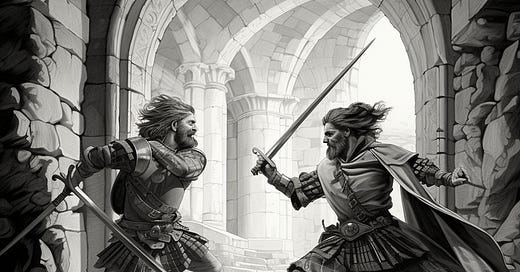The Harrowing Tale of Clan MacLeod's Tyrant Chief, Ian Dubh
In the rugged landscapes of the Scottish Highlands, amidst the mist-shrouded hills and ancient castles, a tale of power, betrayal, and brutality unfolds. The 16th century was a time of fierce clan rivalries, where the struggle for leadership often led to bloodshed and treachery. Within this tumultuous era, one name stands out – Ian Dubh, a man whose reign as chief of the MacLeod clan is shrouded in darkness. This blog post delves into the history of Ian Dubh, how he ascended to the position of chief, the brutalities he unleashed upon his people, and the ultimate downfall that awaited him. Set against the backdrop of the Scottish Highlands during the 16th century, this is a story that highlights both the complexities and the harsh realities of clan dynamics.
The Rise to Power
The stage was set in the mid-16th century, amidst the craggy cliffs and sprawling landscapes of the Scottish Highlands. Ian Dubh, a son of the MacLeod clan, had ambitions that would forever alter the course of his clan's history. As the rightful heir to the chiefdom, Ian Dubh's ascension seemed inevitable. However, his path to power was not one of honor and dignity, but of cunning and violence. Donald, the rightful chief, had left the country, leaving the leadership vacuum ripe for Ian Dubh's treacherous grasp.
A Reign of Terror
Ian Dubh's reign was marked by a series of ruthless and brutal acts that sent shockwaves through the clan. He ruled with an iron fist, relying on fear and coercion to maintain his grip on power. The MacLeod clan, once a close-knit community, now lived in perpetual dread of their leader's wrath. It was during this period that Ian Dubh orchestrated the infamous massacre of his own kin, a grim event that showcased his ruthlessness. The chilling accounts of his deeds reverberated across the Highlands, painting a vivid portrait of a man consumed by his thirst for supremacy.
The Castle of Dread
Dunvegan Castle, nestled along the rugged coastline of Skye, became the heart of Ian Dubh's rule. The imposing fortress, with its stone walls and ominous towers, served as both a symbol of his power and a prison for those who dared to oppose him. Inside its walls, Ian Dubh's malevolent presence loomed large, as he ruled through a combination of fear and manipulation. The castle, once a beacon of strength for the clan, had been transformed into a place of terror under his rule.
The Downfall
As the years went by, Ian Dubh's atrocities could not go unchallenged forever. Tormod MacLeod, a relative and rightful heir, emerged as a beacon of hope for the oppressed clan members. Supported by allies, Tormod gathered his forces to challenge Ian Dubh's reign of terror. The clash that followed was a culmination of years of resentment and despair, a battle that would determine the fate of the MacLeod clan.
The Final Hours
Tormod's forces managed to breach the walls of Dunvegan Castle, shattering the aura of invincibility that had surrounded Ian Dubh for years. The fortress, once a sanctuary for his brutality, now became his prison. The tables had turned, and the man who had reveled in causing suffering was now facing his own reckoning. The showdown within the castle's walls marked the climax of Ian Dubh's dark tale.
The End of an Era
Ian Dubh's capture marked the end of his reign of terror, but it also served as a reminder of the cost of his actions. The man who had wielded power with cruelty was now at the mercy of those he had oppressed. His fate was sealed, and justice would be served in a manner that echoed the brutalities he had committed.
Conclusion
The story of Ian Dubh's brutal reign is a somber reminder of the complexities of power and the depths to which individuals can descend when consumed by ambition. Set against the stark beauty of the Scottish Highlands during the 16th century, this tale of treachery, violence, and downfall serves as a cautionary tale for all time. Ian Dubh's legacy is one of infamy, a stark reminder that history is replete with figures whose actions cast a dark shadow over their times.





